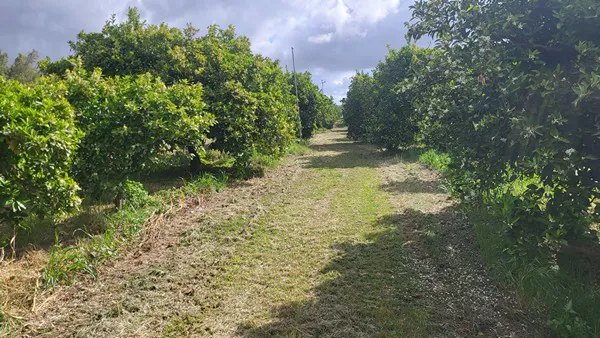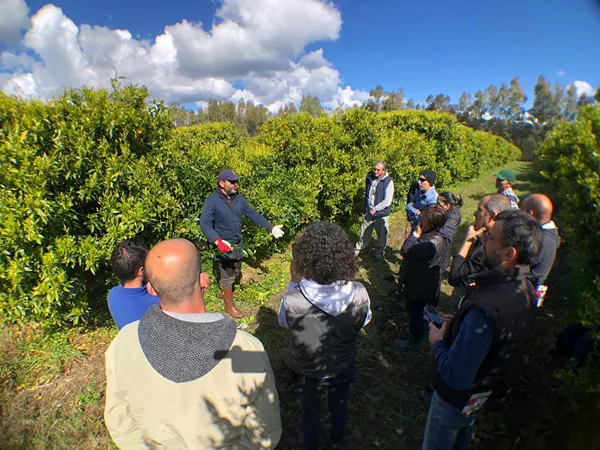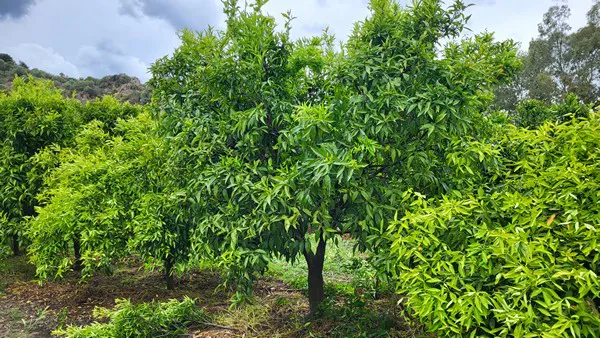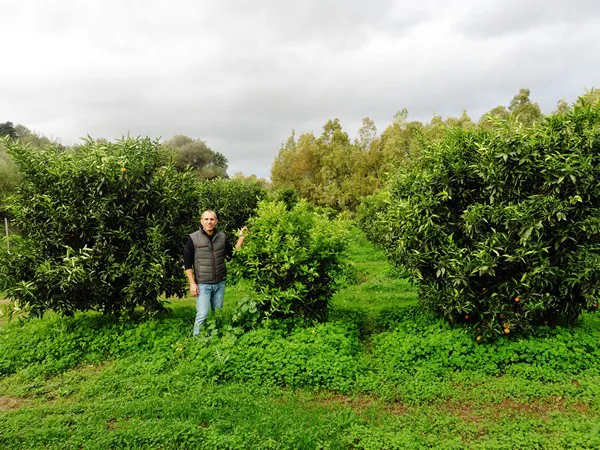Everyone knows that the soil and weather conditions of Sardinia make it ideal for the cultivation of many tree species, especially citrus fruit. However, the three leading production areas of Sarrabus, Villacidro e and the Oristano province still feature citrus groves managed with outdated techniques unsuitable to make the most of the plants and resources and obtain the best quality and quantities.
 Typical low-density citrus grove (6x5 m) managed using traditional systems and with an obsolete spray irrigation system.
Typical low-density citrus grove (6x5 m) managed using traditional systems and with an obsolete spray irrigation system.
FreshPlaza talked about it with agronomist Vito Vitelli, who has been organizing training and information events on innovative cultivation techniques for years, and with entrepreneur Andriano Solinas, who has decided to implement the new trends in citrus fruit management.
 A moment during the day dedicated to citrus fruit cultivation organized by agronomist Vito Vitelli in Sardinia.
A moment during the day dedicated to citrus fruit cultivation organized by agronomist Vito Vitelli in Sardinia.
"80% of the Sardinian citrus fruit cultivation is still in the early 1980s. Good part of the groves are of the 'Navel' and 'Biondo' orange varieties, plus there are common clementines on Arancio Amaro and Citrange troyer rootstocks, though lemons have become more popular lately. Groves are often pruned using the old system and equipped with obsolete spray irrigation and fertigation systems, which compromise plant productivity making them not very profitable but very expensive. We are proposing systems that reduce plant volume to improve the efficiency of the photosynthesis. The aim is to obtain smaller trees to increase density and go from the current 40 to 800-900 plants/hectare."
 Thickening
Thickening
"We are recommending rootstocks that withstand abnormal soil conditions as well as localized micro-irrigation systems for a region where water is lacking and precipitations are irregular. We also suggest the most modern varieties to extend the harvesting calendar, also considering tourism on the island and the lack of Italian produce during the summer months."
 Lemons are getting more popular in Sardinia due to tourist demand. In the photo, high-density (5x2.5 m) lemon grove of the late "Verna" variety managed by Adriano Solinas in the Sarrabus area.
Lemons are getting more popular in Sardinia due to tourist demand. In the photo, high-density (5x2.5 m) lemon grove of the late "Verna" variety managed by Adriano Solinas in the Sarrabus area.
We asked the agronomist what can be done to optimize and rejuvenate Sardinian citrus groves. "Even those who have managed groves using the wrong techniques have another chance. They must intervene with drastic pruning, varietal reconversion with re-grafting and thickening and increase density. Growers need to overcome the distrust that seems to be widespread on the island and be open to agronomic innovation."
 Adriano Solinas shows the evolution of his citrus grove in the Sarrabus area. Over the years, he opted for innovative management techniques.
Adriano Solinas shows the evolution of his citrus grove in the Sarrabus area. Over the years, he opted for innovative management techniques.
Adriano Solinas, an entrepreneur from southern Sardinia who owns 2 hectares of clementines, is one of those who welcomed the suggestions. "I planted the grove 10 years ago and it was not giving me great satisfaction until I decided to embrace innovation. Now my groves are used as an example to show other producers how revolutionary aspects enable the achievement of production results appreciated by the markets. Trees are currently compact with a height not exceeding 2.5 m to facilitate harvesting operations and are managed very well when it comes to irrigation, nutrition and foliage. Technical assistance that can help local producers change their mindset is lacking in Sardinia."
For further information:
Vito Vitelli, agronomist
+39 3392511629
vitovitelli@tiscali.it
vitovitelli.blogspot.com
